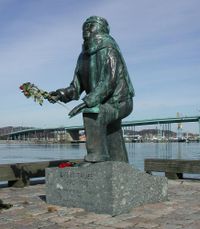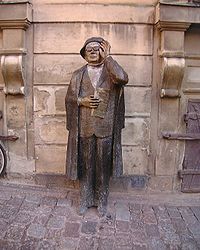fiction.wikisort.org - Writer
Axel Evert Taube (Swedish pronunciation: [ˈěːvɛʈ ˈʈoːb] (![]() listen);[lower-alpha 1] 12 March 1890 – 31 January 1976) was a Swedish author, artist, composer and singer. He is widely regarded as one of Sweden's most respected musicians and the foremost troubadour of the Swedish ballad tradition in the 20th century.[1]
listen);[lower-alpha 1] 12 March 1890 – 31 January 1976) was a Swedish author, artist, composer and singer. He is widely regarded as one of Sweden's most respected musicians and the foremost troubadour of the Swedish ballad tradition in the 20th century.[1]
Evert Taube | |
|---|---|
 Evert Taube in 1961. | |
| Background information | |
| Birth name | Axel Evert Taube |
| Born | 12 March 1890 Gothenburg, Sweden |
| Died | 31 January 1976 (aged 85) Stockholm, Sweden |
| Occupation(s) | Musician, singer-songwriter, author |
| Instrument(s) | Lute, guitar |
| Years active | 1918–1974 |
Early life
Evert Taube was born in 1890 in Gothenburg, and brought up on the island of Vinga, Västergötland, where his father, Carl Gunnar Taube, a ship's captain, was the lighthouse keeper. His mother was Julia Sofia Jacobsdotter. Taube belongs to an untitled branch of the Baltic German noble Taube family, introduced at the Swedish House of Nobility in 1668 as noble family No. 734.[1]
Career

Having spent two years (1907–1909) sailing around the Red Sea, Ceylon and South Africa, Taube began his career as a singer-songwriter and collector of sailors' songs, and on Christmas Eve 1908, on board the Norwegian ship SS Bergen headed for Spain, he performed "Turalleri, piken fra Hamburg".
Following a five-year stay (1910–1915) in Argentina, he developed an interest in Latin American music and introduced the Argentinian tango to Sweden in the twenties. Contrary to widespread perceptions, Taube did not work as a gaucho (cowboy) on the Pampas but as a foreman supervising workers who were digging canals designed to prevent flooding on the vast plains.
He is perhaps best known as a depictor of the idyllic, with motifs from the Swedish archipelagoes and from the Mediterranean, from a perspective every Swedish four-week holiday tourist could recognize. But he also wrote the most hard-hitting anti-fascist anti-war poem in the Swedish language, "Målaren och Maria Pia", about the Italian war in Abyssinia, from the late 30s. He also composed the anthem of the budding environmental movement in the 70s, "Änglamark" (originally written for the successful 1971 Hasse & Tage film The Apple War).
Taube's literary secretary Inga-Britt Fredholm was from late 1950s working as a secretary at the Park Avenue Hotel in Gothenburg. There, in 1962, Evert Taube met her and this led to her becoming his literary secretary for more than ten years. During the 1964–1965 period she undertook travel for work, along with Taube, going to the Antibes in France and to the Pampas in Argentina.[2] She collaborated with Astri Taube on "Vid tiden för Astri och Apollon: okända dikter och berättelser", published in 1964.[3]
During the 1960s Fredholm collected Evert Taube's stories and published them in eight volumes at Albert Bonniers Förlag under the shared title of "Samlade berättelser med tillhörande visor och ballader", released 1966–1967. In the 1970s she produced two pictorial biographies of Taube: ”När jag var en ung caballero: en bildbiografi" (1970) and ”Kom i min famn: Evert Taube 1920-1971 : en bildbiografi" (1972).[4][5]
Among Taube's most famous songs are "Calle Schewens vals", "Min älskling (du är som en ros)", "Dans på Sunnanö", "Brevet Från Lillan", "Flickan i Havanna", "Änglamark", "Sjösala vals", "Fritiof och Carmencita", "Så skimrande var aldrig havet" and "Så länge skutan kan gå".[1]
In 1976 he released an album of songs (on SR Records) about and by Sweden's 18th century bard, Carl Michael Bellman, performing 9 of Bellman's Fredman's Epistles including the ever popular Vila vid denna källa, Ulla! min Ulla! säj, får jag dig bjuda, and Solen glimmar blank och trind.[6]
Taube has been translated into English by Helen Asbury,[7] Paul Britten Austin,[8] Emily Melcher[9] and others. His songs have been recorded in English by Roger Whittaker,[10] Sven-Bertil Taube,[11] Martin Best,[12] Roger Hinchliffe[13] and Emily Melcher.[9]
Personal life




In 1925, he married Astri Bergman Taube, a painter and sculptress.
Taube died in Stockholm and is buried on the churchyard of Maria Magdalena Church on Södermalm.[1]
Taube had a summer house called Sjösala, located in Stavsnäs, which was burned down by Mona Wallén-Hjerpe in 1969.[14]
Honors
On his 60th birthday in 1950, Taube received the Bellman Award from the Swedish Academy and in 1960 he received an honorary doctorate from Gothenburg University. He was elected as a member of the Royal Swedish Academy of Music in 1970.[1]
Taube is regarded as one of the finest troubadours in Sweden. There is a complete pavilion, "Evert Taube's World" opened in 2008, dedicated to him at Liseberg Theme Park in Gothenburg.
On 25 March 2010, Norwegian Air Shuttle's (Norwegian.com) new Boeing 737-8FZ LN-NOV (msn 31713) was accepted at the Oslo (Gardermoen) base with the tail image of Evert Taube.[citation needed]
On 6 April 2011, the Bank of Sweden announced that Taube's portrait will feature on the 50 kronor banknote, beginning in 2014–15.[15]
On 12 March 2013, a Google doodle was dedicated to him.
Children
- Per-Evert Arvid Joachim Taube (1926–2009)
- Rose Marie Astrid Elisabet Taube (1928–1928)
- Ellinor Gunnel Astri Elisabeth Taube (1930–1998)
- Sven-Bertil Gunnar Evert Taube (born 1934)
Publications
- Sjösalaboken (1942), with illustrations by Roland Svensson.
Biography in English
- I Come From A Raging Sea 1967[16]
- A History of Swedish Literature 1989[17]
- A History of Swedish Literature 1996[18]
See also
- List of Swedes in music
- Swedish ballad tradition
Notes
- In isolation, Taube is pronounced [ˈtoːb].
References
- Evert Taube. sv.wikipedia.org. Retrieved: 27 June 2013.
- Matz, Edvard; Nilsson, Gunnar (1986). Äventyret Evert: en bok om färder med Evert Taube till hans diktnings landskap (in Swedish). Stockholm: Rabén & Sjögren. p. 20c, 25c, 28, 45 (photo), 47c, 61, 68c, 71 (photo), 77c, 82, 94c, 103c, 136, 138, 141, 144. ISBN 91-29-57840-X. SELIBR 7235962.
- Taube, Evert; Fredholm, Inga-Britt; Taube, Astri (1964), Vid tiden för Astri och Apollon: okända dikter och berättelser (in Swedish), Stockholm: Bonnier, SELIBR 1246736
- Taube, Evert; Fredholm, Inga-Britt (1970). När jag var en ung caballero: en bildbiografi (in Swedish). Stockholm: Bonnier. SELIBR 2818173.
- Fredholm, Inga-Britt (1972). Kom i min famn: Evert Taube 1920-1971 : en bildbiografi (in Swedish). Stockholm: Bonnier. ISBN 9100377015. SELIBR 7143753.
- "Evert Taube Sjunger Och Berättar Om Carl Michael Bellman". Discogs. Retrieved 15 March 2016.
- Sea Ballads and Other Songs by Evert Taube, trans. by Helen Asbury, (Stockholm: Kings Press, 1940).
- I Come From A Raging Sea by Evert Taube, trans. by Paul Britten Austin, (London: Owen, 1967).
- A Talk While Dancing CD, trans. by Emily Melcher, (Madison: Emily Melcher, 1999).
- Where Angels Tread (Stockholm: Philips, 1972).
- A Swedish Musical Odyssey (Stockholm: EMI, 1977).
- Göran Fristorp and Martin Best (Stockholm: Sonet, 1983).
- Sweden's Greatest CD, trans. by Roger Hinchliffe, (Stockholm: Roger Records, 1988).
- The Sjösala fire everttaube.info. Retrieved 18 March 2012.
- Sweden’s new banknotes and coins Archived 27 September 2011 at the Wayback Machine riksbank.com. Retrieved 18 March 2012.
- I Come From A Raging Sea, foreword by Inga-Britt Fredholm, (London: Owen, 1967).
- A History of Swedish Literature by Ingemar Algulin, (Stockholm: Swedish Institute, 1989).
- A History of Swedish Literature edited by Lars G. Warme, (Lincoln: University of Nebraska Press, 1996).
External links
Swedish
- Works by or about Evert Taube at Internet Archive
- Taube society
- Evert Taube discography
- Evert Taube at Open Library.
- Evert Taube homepage (unofficial)
English
- Evert Taube biography
- Evert Taube at AllMusic.
Translations
- A Talk While Dancing
- Sea Ballads and Other Songs
- While still the boat sails along (Så länge skutan kan gå)
- The cheerful baker of San Remo (Den glade bagaren i San Remo)
- Morning song at Baggensfjärden (Morgonsång på Baggensfjärden)
- Videos
- Byssan lull on YouTube
- Så skimrande var aldrig havet (The ocean has never been more beautiful) on YouTube
- Calle Schewen's Waltz and Sov på min arm (Sleep in my arms) on YouTube
На других языках
[de] Evert Taube
Evert Axel Taube (Aussprache: [.mw-parser-output .IPA a{text-decoration:none}ˌeːvəʈ ˈtoːb], * 12. März 1890 in Göteborg; † 31. Januar 1976 in Stockholm) war ein schwedischer Dichter, Komponist, Sänger und Maler. Er gehörte dem deutsch-baltischen Adelsgeschlecht Taube an.- [en] Evert Taube
[es] Evert Taube
Evert Axel Taube (Nacido el 12 de marzo de 1890 en Gotemburgo – fallecido el 31 de enero de 1976 en Estocolmo) fue un poeta, artista, compositor y cantor sueco. Por su amplia producción musical es considerado como uno de los más importantes músicos suecos.[ru] Тоб, Эверт
А́ксель Э́верт Тоб[1] (швед. Axel Evert Taube (инф.); 12 марта 1890 года в Гётеборге, Швеция — 31 января 1976 года в Стокгольме, Швеция) — шведский поэт, композитор, эстрадный певец. Отпрыск шведского дворянского рода Тоб (Таубе).Другой контент может иметь иную лицензию. Перед использованием материалов сайта WikiSort.org внимательно изучите правила лицензирования конкретных элементов наполнения сайта.
WikiSort.org - проект по пересортировке и дополнению контента Википедии